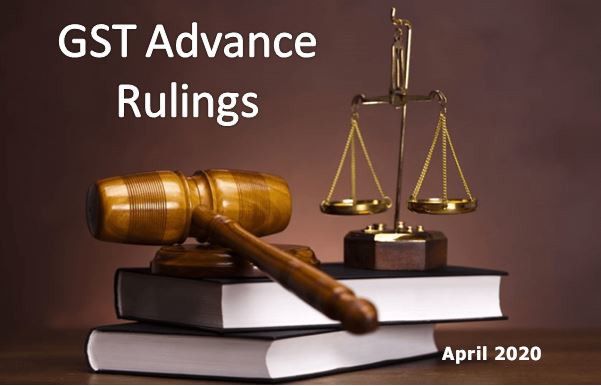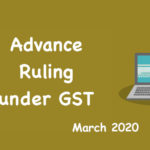1. Whether GST is payable under RCM on the salary paid to the directors of a company?
Held: Yes
In the case of M/s. Clay Craft India Pvt. Ltd.-AAR Rajasthan, the applicant is a private limited company. Its directors are working as employees of the company for which they are being compensated by the company by regular salary and other allowances. The directors are treated at par with other employees of the company. The applicant has sought an advance ruling on whether GST is payable under RCM on the salary paid to the directors?
The applicant submitted that the salary being paid to the directors are booked as ‘Income from Salary’ in their personal I.T returns. Further, the services provided by an employee to his employer are under clause-1 of the Schedule-III of the CGST Act, 2017. It also stated that the term ‘employee’ has not been defined under GST Act. As per Cambridge Dictionary, an employee is ‘someone who is paid to work for someone else’. Therefore, the directors are nothing but employees only.
The Authority stated that consideration in form of salary and commission paid to the Directors by the company is against the services provided by them to the company and the company is the recipient of such services and the directors are the supplier. It also explained the term ‘consideration’ in terms of section 2(31) of the CGST Act, 2017. Further, it observed that consideration paid to the directors is covered under the Notification No. 13/2017 C.T (R) dated 28.06.2017 which provides the list of services on which tax is to be paid under RCM by the recipient. Also, consideration paid to the directors is against the supply of services provided by them to the applicant company and are not covered under Schedule-III of the CGST Act, 2017. Thus, the service rendered by the director to the company for which consideration is paid by them in any head is liable to GST under RCM.
Author’s Comment: The said ruling is given without appraising the facts and position of law in correct perspective. Salary paid to Director should not be equated with remuneration or sitting fee inasmuch as the former is governed by master-servant relationship and the latter is not such a case. Hence the author feels that it will be corrected by the AAAR once matter is taken up explaining the facts properly. So there should not be any GST applicable on Salary paid to Directors as it will be governed by Sch-III only.
2. Whether commission earned from auctioning of flowers is exempt from GST?
Held: Yes
In case of M/s International Flower Auction Bangalore Limited-AAR Karnataka, the applicant is in the business of auctioning flowers and are a commission agent for the flower growers. It is established with the aim to strike the potential of both export and domestic flower market, with a prime objective to auction high quality cut flowers on a daily basis.
The applicant creates a platform for both growers and buyers who can earn great profits. It takes 3.5% from growers and 1.5% from buyers as commission for services rendered. It further submitted that it falls within the definition of “Agent” under the CGST Act, 2017. It also stated that the commission earned is exempt from tax in terms of Notification No. 12/2017-C.T (R).
The Authority made a reference of the Circular No. 57/31/2018-GST dated 04.09.2018 issued by CBIC. As per the circular, the provision of goods by the growers to the applicant is covered under Entry No. 3 of the Schedule-I of the CGST Act, 2017. It further stated that the applicant falls within the definition of ‘Agent’ under the CGST Act, 2017. Since, the applicant is a commission agent and he is providing services for sale or purchase of agricultural produce, the same is exempted under the Notification No. 12/2017-C.T (R) dated 28.06.2017.
3. Whether goods supplied through PDS are exempt from GST?
Held: No
In the case of M/s Dipeet Agarwal- AAR West Bengal, the applicant supplies consumer goods like biscuits, soaps etc. earmarked ‘FOR PDS SUPPLYONLY’ to fair price shops/PDS distributors. It seeks a ruling on whether he is liable to pay GST on such supplies of goods?
The applicant submitted that he acts as an associate of the West Bengal Essential Commodities Supply Corporation Ltd. against payment of a monthly administrative charge at a rate fixed by the Government of West Bengal. He bears all cost and charges, including packaging, loading, railway freight, demurrage etc. and bears all the risk associated with transportation, warehousing and quality of the products. He is merely acting as the canalising agency on behalf of the Govt. and the WBECSC Ltd, having no control over the pricing and the market share. Hence, his supplies of goods for distribution through PDS should be exempt from payment of the GST.
The Authority stated that supply of goods through PDS is not exempt under Notification No. 2/2017-C.T (R) dated 28.06.2017 as amended from time to time. Further, the applicant’s services are not covered under the Schedule-III of the CGST Act, 2017. Hence, the supply of goods is taxable under GST.
4. Whether GST is leviable on salaries paid to expat employees for services rendered by them to Indian office of foreign company?
Held: No
In the case of M/s Hitachi Power Europe GmbH –AAR Uttar Pradesh,the applicant, a foreign company, has been awarded with contracts for supply of goods and supervisory services by companies incorporated under the Companies Act, 2013 of India. It has sought an advance ruling on whether GST is applicable on the accounting entry made for the purpose of Indian accounting requirements in the books of account of Project Office for salary cost of Expat employees?
As per the applicant, under the Foreign Exchange Management Act, 1999, a Foreign Company executing projects in India is permitted to open an office in India to undertake such projects, commonly referred to as “Project Office”. For carrying out the projects in India, the Expat employees (employees of the Head Office) would work out from the Project Office in India. As the Project Office is not a separate legal entity and merely an extension of Head Office in India, these Expat employees are employees of Project Office. It contended that the transaction under reference would not fall under the meaning of the term ‘supply’ for the reason that there is no intention to provide or receive services and hence do not fall under the scope of the term ‘Supply’. Further, the said transaction is covered under the scope of activities or transactions specified in Schedule III – “services by an employee to the employer in the course of or in relation to his employment” and is hence outside the ambit of GST and the transaction will not qualify as ‘import of services’.
The Authority stated that as per Notification No. FEMA 22 (R)/2016-RB, dated 31 March, 2016, it could be understood that a Project Office is merely an extension of the foreign company in India to undertake the project in India and limited to undertake compliances required under various tax and regulatory requirements in India. Accordingly, the transactions between the foreign company and project office are an intra-company affair. Further, Further the project office is fulfilling all the obligations as employer with reference to expat employees and “Employee-Employer relation exist between the project office and expat employees”. Therefore, the service provided by the expat employees to the project office fall under the category of “Services by an employee to the employer in the course of or in relation to his employment” of Schedule-III of the CGST Act, 2017. Accordingly, no GST is leviable on the salary paid to the expat employees and reflected in the books of account of the project office.
5. Whether consultancy services provided to the State Government for upgrading of highways and roads are taxable under GST?
Held: Yes
In the case of M/S Sheladia Associates. Inc.-AAR Mizoram, the applicant has been rendering Project Management, Project Planning and Construction Supervision services for improving 81 KM of State Highways and Mizoram District Roads for enhanced connectivity. An advance ruling has been sought by the applicant relating to the applicability of Sl. No. 3 of the Notification No. 12/2017-Central Tax (Rate), dated 28-6-2017 to the services provided by them by way of providing engineering and consultancy services under the contract signed by them with the Public Works Department, Government of Mizoram.
The applicant submitted that three requirements have to be satisfied for claiming exemption under the said notification:
a) No supply of goods.
Supply shall be pure services, which shall not include works contract services or composite supplies involving supply of services. In other words, the contract should not include any supply of goods either by way of works contract or composite supply.
b) Recipient of Service.
The recipient should be Central Government, State Government or Union Territory or Local Authority or a Governmental Authority.
c) Functions of Panchayat or Municipality
Services should be by way of any activity in relation to any function entrusted to a Panchayat under Article 243G of the Constitution or in relation to any function entrusted to a Municipality under Article 243W of the Constitution.
The applicant contends that it satisfies all the above conditions and services provided by it should fall under the Sl. No. 3 of the Notification No. 12/2017-Central Tax (Rate), dated 28-6-2017.
The Authority stated that it is a case where no supply of goods, against consideration or payment is involved. Hence, it is a case of Pure Service, although the subject of Contract signed between both the parties mentions it as ‘Works Contract Service’. The ambit of the service provided by the applicant does not fit into the definition of “Works Contract” as per Section 2(119) of the CGST Act, 2017/MGST Act, 2017 as there is no involvement of supply of goods. It is not a composite supply also as defined under Section 2(30) of the CGST Act, 2017/MGST Act, 2017. Thus, being a Pure Service, it qualifies for notification benefits vide Sl. No. 3. Chapter 99 of the Notification No. 12/2017-Central Tax (Rate), dated 28-6-2017. Also the second condition is fulfilled as the recipient is the State Government of Mizoram, through Public Works Department. Thus, on this account also the service rendered by the Consultant qualifies for the notification benefit.
However, it fails to fulfill the third condition as the services are not covered under Article 243G and Article 243W of the Constitution of India.
Hence, the services provided to the State Government for upgrading of highways and roads are not exempt under GST
6. Whether an importer can take credit of IGST paid on import of goods where imported goods are directly supplied from the port to customer’s place without obtaining registration in the state where goods are imported?
Held: Yes
In case of M/S Kardex India Storage Solution Pvt Ltd.–AAR Karnataka,the applicant is an importer of storage solutions and vertical storage solution machines from Germany and distributes the imported goods to industrial customers all over India. The applicant intends to import the goods to the nearest port of the customer’s location and supply directly to the customer’s without bringing the goods to its registered place. The applicant has sought an advance ruling on whether he is entitled to claim the credit of IGST paid on the import of goods?
The applicant contended that the place of supply in case of import of goods is the location of the importer as per section 11(a) of the IGST Act, 2017. Further, as per IEC, the location at which the importer files the bill of entry for clearance of goods and where importer is registered is the location of the supplier. Therefore, the place of supply of the imported goods would be the registered place of business premises. It further submitted that though the goods are supplied directly from the port of import to the customer’s place, it is deemed that the imported goods are received at the registered place of business of importer and then supplied to the customer’s place. It has placed reliance on the Advance Rulings Authority, Maharashtra in the case of M/s Aarel Import Export Pvt. Ltd and M/s Sonkamal Enterprises Pvt. Ltd.
The Authority stated that goods imported into the territory of India, till they cross customs frontiers of India, shall be treated as supply of goods in the course of inter-state trade or commerce in terms of section-7(2) of the IGST Act, 2017 and the applicant is liable to pay IGST on the value of goods imported into India on RCM basis. Further, section-20 of the IGST Act, 2017 read with section-16 of the CGST Act, 2017 provides that IGST paid on import of goods can be utilized as the credit of input tax if such imported goods are used in the course or furtherance of business. Therefore, the applicant is entitled to claim the credit of IGST paid on import of goods. Also, he is liable to issue IGST tax invoice to its customers in terms of section-20 of the IGST Act, 2017 read with section-31 of the CGST Act, 2017.
7. Whether supply of stores in foreign going vessels is a zero rated supply under GST?
Held: No
In the case of M/s Shewratan Company Pvt. Ltd.-AAR West Bengal, the applicant supplies foreign going vessels stores like paint, rope, spare parts, electronic equipment etc. It seeks a ruling on whether supplies of stores in foreign going vessels are export under GST?
The applicant submitted that section 88(a) of the Customs Act, 1962 provides that any warehoused goods may be taken on board any foreign going vessel as stores without payment of import duty if a shipping bill or a bill of export has been presented in respect of such goods in the prescribed form, the export duty etc. has been paid and the proper officer has passed an order for clearance of such goods for exportation. Section 89 of the 1962 Act provides that the goods manufactured in India and required as stores on any foreign going vessel may be exported free of duty. Hence, the supply of stores in a foreign going vessel is export and a zero-rated supply in terms of section 16 of the IGST Act.
The Authority stated that warehoused goods can either be cleared for home consumption or exported. However, when used as stores in a foreign going vessel, such goods are neither taken out of India (unless they are specifically marked for a foreign destination) to a place outside India nor cleared for home consumption. At the same time, they need documentation like export because such goods cross the limits of the customs area when taken on board the foreign going vessel. It further observed that the export of goods under section 2(5) of the IGST Act and section 2(19) of the 1962 Act means taking the goods from India to a place outside India. The place of supply shall, in terms of section 11(b) of the IGST Act, be the location outside India. Export under the IGST Act (and the 1962 Act as well), therefore, has a much narrower meaning. A foreign going vessel anchored within the territory of India is not a place outside India and taking the stores on board such a vessel does not amount to supply to a location outside India. Section 69 of the Customs Act, 1962 cannot, therefore, cover within the ambit of export the case where the warehoused goods are taken on board a foreign going vessel. Hence, the applicant’s supply of stores to foreign going vessels, as defined under section 2(21) of the Customs Act, 1962 Act, is not export or zero-rated supply, unless it is marked specifically for a location outside India.
8. Whether the activity of collecting exam fee (charged by any university or institution) from the students and remitting to that particular university or institution without any value addition to it, amounts to taxable supply under GST?
Held: Exempt
In the case of M/s Arivu Educational Consultants Pvt. Ltd.- AAR Karnataka, the applicant is a private limited Company which provides various coaching and training services in relation to various degrees. In this process, the applicant collects certain amount as examination fees from the students and remits the same to the respective institute or college or universities without adding any profit element. It has sought an advance ruling on whether the activity of collecting exam fee from the students and remitting to that particular university or institution without any value addition to it, amounts to taxable supply under GST?
The applicant contends that they are merely acting as pure agent and hence the service is not liable to GST.
The Authority stated that the applicant is an educational consultant and a professional in the field of education who uses his experience in teaching, to help with the curriculum development. The applicant conducts the training or coaching classes for the students. It does not have any specific curriculum and do not conduct any examination or award any qualification. Hence, the applicant is not an educational institution in terms of the Notification No.12/2017-C.T(R) dated 28.06.2017. Further, the amount charged by the applicant as examination fees is separately indicated in the invoice issued to the students, apart from the training fees. Hence, the applicant satisfies all the conditions of the pure agent as narrated in Rule-33 of the CGST Rules, 2017. Therefore, the amount of fee collected by the applicant from the students as exam fees which is remitted to the respective colleges or institution without any profit element is excluded from the value of supply.



